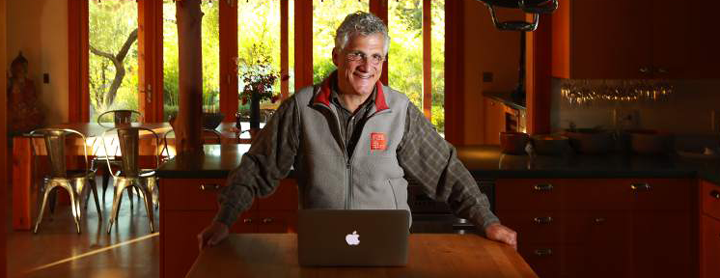News



Culinary Institute of America instructor Will Rosenzweig a steward to food entrepreneurs
Press Democrat | Posted: 12/01/2015
View original article here.
[ssba]
Press Release



Culinary Institute of America instructor Will Rosenzweig a steward to food entrepreneurs
Posted: 12/01/2015
Walking through the garden at Will Rosenzweig’s Healdsburg farmhouse provides a glimpse at the way this successful entrepreneur and academician approaches the business of food. Unlike the machine-based society of artificial intelligence and self-driving cars, Rosenzweig views business as more akin to a living organism that requires diversity and respect for human beings, so that it can grow organically. “I really like it when plants grow together and become symbiotic,” Rosenzweig said while giving a tour of the 3-acre property. “In a garden, you start out with things that already exist — soil, water, climate. Then you envision how to solve a problem or meet a need. It’s the same in business.” The many worlds of Rosenzweig — venture capital and gardening, academia and art — overlap here at the energy-efficient Victorian he renovated with his wife, Dr. Carla Fracchia, an obstetrician/gynecologist at Kaiser Permanente in San Francisco. From the English rose garden in front to the California natives by the pool and the giant palm tree outside the kitchen, the garden connects Rosenzweig to nature and to the deep knowledge of the food world he has cultivated for the past 25 years, first as founding CEO of The Republic of Tea in 1992, then as managing partner of the venture capital firm Physic Ventures of San Francisco, which he founded in 2006 to invest in healthy, do-good companies. In 2010, Rosenzweig received the prestigious Oslo Business for Peace Award, given annually to people around the globe who have grown businesses that are both socially beneficial and financially sensible. For the past 16 years, he also has taught at the Haas School of Business at UC Berkeley, serving as its first professor of social entrepreneurship and as director of the school’s Center for Responsible Business, founded in part by Paul Newman. “I really enjoy teaching,” said Rosenzweig, 56. “Learning from smart, talented people is a gift. If you listen to students, you see the future ” In his latest academic position as dean of the new Food Business School based at the Culinary Institute of America at Greystone, Rosenzweig continues to steward other food entrepreneurs and give back to a growing field he views as ripe for change and innovation. “There’s a growing interest in food and the food system … not just eating but nutrition, where it comes from and how to grow it,” he said. “It’s clearly ready for innovation. The food we’ve been using was designed for a different time and place.” Touted as the nation’s first business school dedicated to food entrepreneurship, the school rolled out its first classes last spring at the CIA’s Greystone campus in St. Helena and has plans to move its offices and courses in 2016 to the Copia campus in downtown Napa. Emerging entrepreneurs Online courses are aimed at emerging entrepreneurs attending other schools or working at jobs, while Innovation Intensives (short, three- or four-day immersion programs) are aimed at proven food entrepreneurs who are trying to take their businesses to the next level. Rosenzweig also hopes to train industry leaders who can innovate into the future. “The CIA is the oldest and most prestigious culinary college,” he said. “They’ve embarked on broadening their impact and scope … the Food Business School is intended to prepare a new generation of leaders to reinvent the food system.” Like other graduate or executive level programs, the Food Business School curriculum developed by Rosenzweig revolves around pragmatic, skill-based learning. Right now, students do not earn credits, but plans for accreditation are in the works. “We see ourselves as a start-up,” Rosenzweig said. “We could design courses and seek accreditation, but we flipped that and said, ‘Let’s build courses that people want.’ It’s human-centered design.” The Food Business School will expand this spring with more online courses, as well as immersion courses held in New York City and San Francisco. This spring, it also will launch the Food Venture Lab, a three-month program designed to enable future industry leaders to pinpoint pressing problems in the current food system, then create businesses to solve them. One of Rosenzweig’s biggest success stories comes from two of his UC Berkeley students, Kristin Groos Richmond and Kirsten Saenz Tobey. They created Revolution Foods, the country’s largest purveyor of healthy school meals. The company also produces healthy packaged meals sold at grocery stores. “They came up with the idea and wrote the business plan in my course,” Rosenzweig said. “That started at one little charter school in Oakland, and it’s now in 12 major cities and seven states. When I see that level of impact — 1.5 million meals a week in schools — that kind of consciousness really inspires me.” As a child growing up in San Pedro in the 1960s, Rosenzweig was inspired by his parents, New Yorkers who had moved to Southern California before he was born. His father worked as a rocket scientist for The Aerospace Corporation, and his mother taught literature as a humanities professor at Long Beach State. “I came to business through art, because artists want to convey meaning,” Rosenzweig said. “I have a funny combination of art and science, and I’ve always tried to integrate those parts of my brain.” As a youth, he also was inspired by the family’s Japanese gardener, who taught him how to plant a rosebush and instilled in him a sense of responsibility that continues to this day. “I’m a conscientious gardener,” he said. “This is my therapy. I spend most of my weekends gardening, and I try to do one thing a year that I think about and design.” Republic of Tea After studying business, theater and film at Cornell University in Ithaca, N.Y., Rosenzweig moved to San Francisco to try his hand at documentary film. At 25, he started his first company in Long Beach, incorporating his interest in business and theater by staging events for companies rolling out new products. At 30, he co-founded The Republic of Tea with Mel and Patricia Ziegler, founders of Banana Republic. The company sourced, blended and packaged organic and exotic teas from all over the world, including teas that were not common at the time, such as white tea and red tea (rooibos). The trio went on write a book about their North Bay start-up, “The Republic of Tea: How an Idea Became a Business,” which gives an insider’s view of how the trio brainstormed the company that spawned the specialty tea movement. “The Bay Area, and the North Bay, is such a great environment for all of this to take root,” Rosenzweig said. “This is where the taste makers, and then the entrepreneurs, take root.”[ssba]



